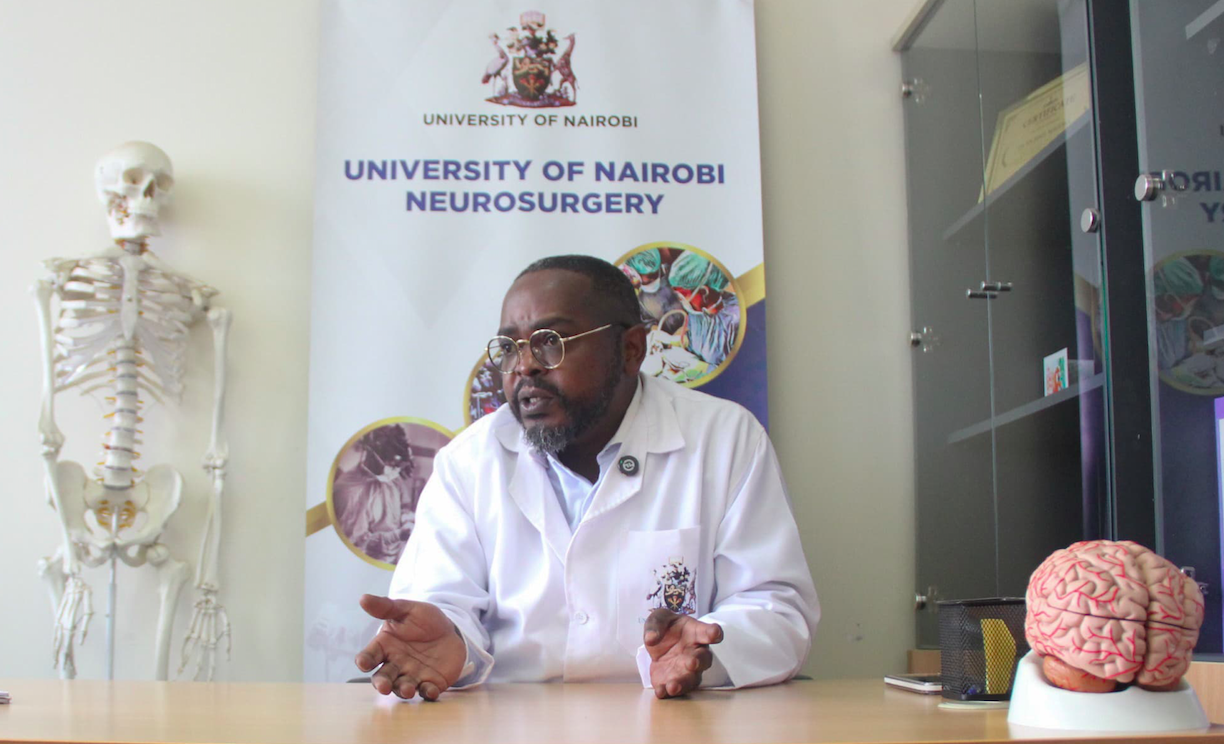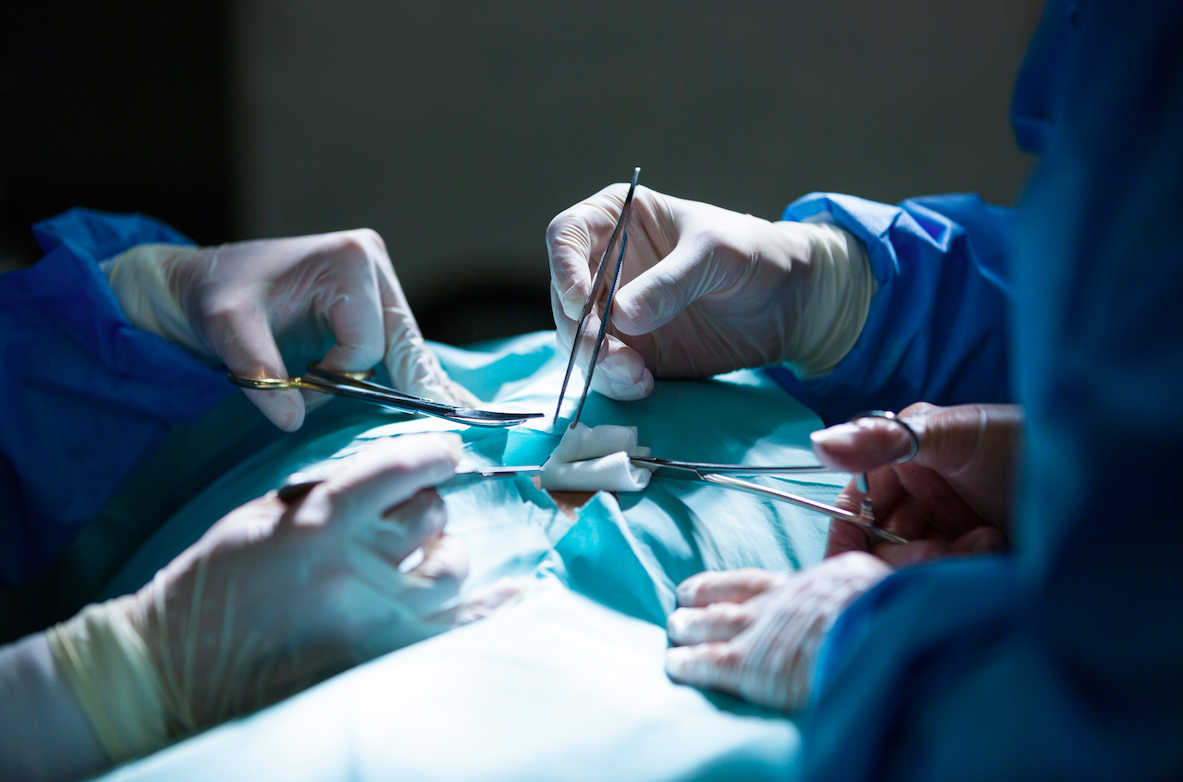 Dr Peter Kitunguu during the interview at the Department of Surgery in the University of Nairobi. He is one of Kenya’s 30-plus neurosurgeons. Photo/ Michael Wambua.
Dr Peter Kitunguu during the interview at the Department of Surgery in the University of Nairobi. He is one of Kenya’s 30-plus neurosurgeons. Photo/ Michael Wambua.As a boy growing up in Nairobi’s Eastlands, PETER KITHIKII KITUNGUU dreamt of becoming a tout or a matatu driver because they seemed to have better lives than many people in the hood.
But his focus changed completely after scoring an ‘A’ in all subjects in the 2001 KCSE (at Starehe Boys Centre), becoming the fourth best student in Kenya. At 41, Dr Kitunguu is today one of Kenya’s approximately 30 neurosurgeons. We caught up with him recently at the Department of Surgery in the University of Nairobi, where he also lectures.
He spoke with DR MICHAEL MUMA about his journey through medical school and the ongoing efforts to bring world-class neurosurgical care to Kenya.
QUESTION: What inspired you to pursue a career in neurosurgery, especially considering it's one of the most demanding surgical specialties?
ANSWER: I didn’t always know I wanted to be a neurosurgeon. It wasn’t one of those childhood dreams. The idea really took shape when I joined medical school. First year, I was introduced to neuroanatomy and something just clicked, the complexity fascinated me. What made it even more compelling were my lecturers. There was something about the way they taught confident, clear, and passionate about their work.
Then one day, everything changed. We had a visiting neurosurgeon from Japan. He came to showcase an endoscope. I remember standing there, watching him work, and in that moment, he transformed. He wasn’t just a man anymore. He became a giant in my eyes. That moment lit a spark I couldn’t ignore. I jumped into research early, shadowed my seniors, soaked up every bit of information I could. The deeper I went, the more certain I became. From there... well, the rest is history.
Post-grad is another animal altogether. One of my teachers, mentors, friends and now colleague used to tell us that it is impossible to fill a full cup. You join the neurosurgery mmed (Master of Medicine) programme, which is an achievement itself, then you quickly realise your cup is rather empty as that is just the starting point of another long arduous journey that involves many long days and nights. It's physically, mentally and emotionally challenging.
How accessible do you think neurosurgical services are to the ordinary Kenyans, especially in rural areas? How many practising neurosurgeons are there in the country?
Access to neurosurgical services goes beyond the availability and accessibility to specialist neurosurgeons. It involves early diagnosis, which depends on educating frontline workers and improving the availability of imaging services like CT and MRI scans which fall under infrastructure. A well-trained neurosurgeon can only be effective if supported by proper equipment, trained staff and system readiness. Healthcare is a pyramid, and the surgeon is simply a piece at the top that needs a strong base to function.

While it’s important to acknowledge the risks of major surgery, the truth is that the work we do is effective, impactful, and absolutely worth doing, says Dr Kitunguu.
Has Artificial
Intelligence affected the field of neurosurgery in any way?
It will affect everything at some point, to some extent. Therefore, it's important to understand AI not as a solution, but a tool. In the sense that it has the capacity to collect data from numerous sources, therefore making it easier to access information.
In essence, when I was doing my BSc, I think that was back in 2006, all we had were those large Cathode ray tube computers that took forever to power up. Access to the internet was by dial-up. I still remember while doing my research, I had to physically go to the library and look for research papers, having to write to the author requesting for a reprint of their publication as access to information was not easily accessible.
Is there a particular patient case or patient story that has profoundly influenced your practice of neurosurgery?
All of them do. We always say, there's a lot of knowledge in books, but your best teacher is always the patients that you interact with along your journey. Even in patients with a similar condition, they never tend to be exactly the same. Each one brings a unique set of challenges medically, emotionally, and personally that test and refine your knowledge and skills. Therefore, it's rather difficult to pick one or two stories as they are all influential in their own way.
Are there conditions or injuries that have become more common now than when you started practising?
While the rise in conditions like cancer can, in part, be attributed to improvements in diagnostics, allowing us to detect more cases—especially aggressive tumors in younger patients without a family history—there is also a noticeable trend towards these conditions becoming more common. At the same time, trauma, particularly among young men, has become an epidemic of its own attributed to risky behaviors, such as riding motorcycles without helmets and ignoring traffic laws, contribute to a surge in accidents. This combination of oncologic challenges and increasing trauma cases has added a significant burden to our healthcare system, making it clear that both prevention and better diagnostics are key to managing these health concerns.
What are some of the most common misconceptions of neurosurgery?
There is a common misconception that neurosurgery often
leads to poor outcomes, but that’s simply not true. We’re seeing excellent
results, lives being changed, and futures restored. While it’s important to
acknowledge the risks of major surgery, the truth is that the work we do is
effective, impactful, and absolutely worth doing.
What advice would you give to the young people who wish to pursue neurosurgery?
I believe we tend to attract a certain type of student who already is driven, who has already gone through their own journey and is probably accomplished. My advice would be to stay the course, persevere through it and keep the dream alive.
How do you manage to maintain a sustainable work-life balance?
I think I'm trying but I don't think there's a
formula to it. What I do is
important, but it's not who I am. In the weight of responsibility, I anchor
myself in faith, family, and friendships. My family and friends remind me to
live deliberately, love deeply, and never forget the core of who I am.
When you think about your legacy, what do you hope it will be?
My legacy isn’t just in the patients I’ve treated or the work I’ve done, but in the lives I’ve touched beyond medicine. In the people I’ve empowered, the love I’ve poured into my children, my family, and the friendships that have stood the test of time.
Word on the street is you're an avid gamer. Do you still play video-games?
Gaming is something I’ve always enjoyed and over time, I’ve come to appreciate how much it sharpens skills like hand-eye coordination. In neurosurgery, especially under the microscope, you’re looking in one direction and operating in another, so that spatial awareness and precision really matter. While I don't game as much now, partly because I don't want my kids glued to screens, it’s still something that’s played a positive, even practical role in my journey.











